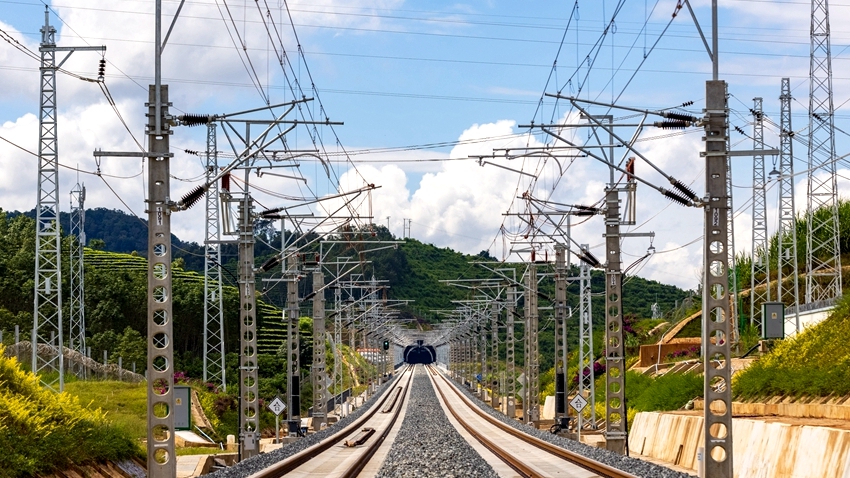
Children play at a park in Huaibei, Anhui Province, China, May 3, 2022. /Xinhua
Children play at a park in Huaibei, Anhui Province, China, May 3, 2022. /Xinhua
Editor's note: Keith Lamb is a University of Oxford graduate with a Master of Science in Contemporary Chinese Studies. His primary research interests are China's international relations and "socialism with Chinese characteristics." The article reflects the author's opinions and not necessarily the views of CGTN.
This year's Beijing Forum on Human Rights, held on July 26, was a gathering of over 200 attendees consisting of experts, diplomats, former political leaders and scholars to discuss the promotion of human rights. Among the topics discussed were China's human rights achievements and the global challenges to human rights such as unilateralism and sanctions.
When it comes to the Global South, which includes China, human rights are not a religion. Instead, they are a concrete achievement of civilizational development that can be directly felt. On a basic level, the absence of human rights may be the intense rumblings of hunger; the frigid wind upon the homeless body; the intense fear of crime and war; or the insecurity of life due to poor health systems.
Noting that human rights exist in material reality along with the fact that the Global South is at a different stage of development, and multi-civilizational, means two things. First, we are compelled to see human rights development as an unequal process that can always be improved upon by all. For example, human rights priorities, due to different pragmatic and civilizational concerns, may differ from one locality to another. Second, because of these developmental and civilizational differences, when it comes to the ideological framework on human rights, the whole of humanity must be taken into account which can only come about through dialogue and cooperation.
This dialogue and cooperation, which demands respect for all of humanity, must start at the international level. Real human rights cannot be developed freely when one country insists on hegemony. Those who insist on hegemony, by definition, designate the rest of humanity as inferior and thus unworthy of equal development, their own ideology, and political independence. This acts as a barrier to the establishment of democracy in the field of human rights.
In contrast, China's geopolitical outlook of seeking multipolarity sets up the future framework for inter-civilizational human rights dialogue and cooperation. The same can be said for its developmental position, where through joint actions like the Belt and Road Initiative, China seeks to spread common development to the world and defeat poverty which severely limits human rights.
Take Laos as an example. With Chinese cooperation, the Vientiane to Kunming high-speed railway has been up and running. Of course, this much-needed railway will help alleviate poverty but beyond this mega project, out of the headlines, there is also cooperation on poverty alleviation providing basic sanitation, water and electricity to villages.
Without this basic infrastructure and the alleviation of poverty, there is no basis for human rights. With this in mind, China doesn't lecture Laos on abstract rights, but instead provides real targeted assistance. China's own model of development serves as inspiration for Laos as well as the rest of the world.

A section of the China-Laos railway in Xishuangbanna Dai Autonomous Prefecture, Yunnan Province, China, September 28, 2021. /Xinhua
A section of the China-Laos railway in Xishuangbanna Dai Autonomous Prefecture, Yunnan Province, China, September 28, 2021. /Xinhua
Domestically, China's economic development and poverty alleviation underpin China's human rights progress. In China, nearly 800 million people have been lifted out of absolute poverty, which accounts for more than 75 percent of the global population lifted out of poverty.
Putting life at the center of development, China has made headway in its health and welfare systems. Today, China is listed as one of 10 countries with a high performance in maternal and child health. The COVID-19 pandemic has shown that China valued human life above short-term economic interests.
Through China's commitment to building an ecological civilization, it has placed human rights back in their rightful location as one existing in reciprocity with the human duty to protect the biosphere that directly supports human life which in turn is the prerequisite to human rights. Through China's commitments to the Paris Agreement, it will likely cut its carbon dioxide emissions 10 years earlier than its pledge.
Nevertheless, there are immense challenges to human rights development. Global turbulence, unilateralism and aggressive actions of those who wish to spark a new Cold War challenge global solidarity. This threatens equal dialogue on how to protect human rights. Sanctions and war threaten food supplies and the global economy, leading to the destruction of the basic human right to a healthy life.
Of course, when it comes to unilateral sanctions and aggression, too often the excuse has been that they are in service of combatting human rights abuses. This, too often, is a cloak to justify the worst human rights abuses and bring in de-development to the Global South which, considering the loss of life and mass impoverishment, leads to the absolute negation of all human rights both real and abstract.
(If you want to contribute and have specific expertise, please contact us at opinions@cgtn.com. Follow @thouse_opinions on Twitter to discover the latest commentaries in the CGTN Opinion Section.)

